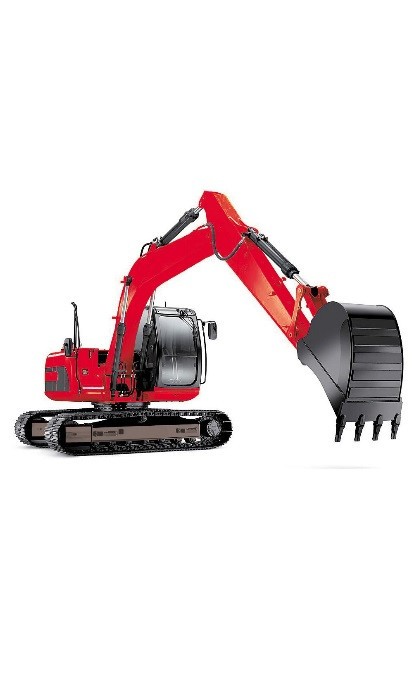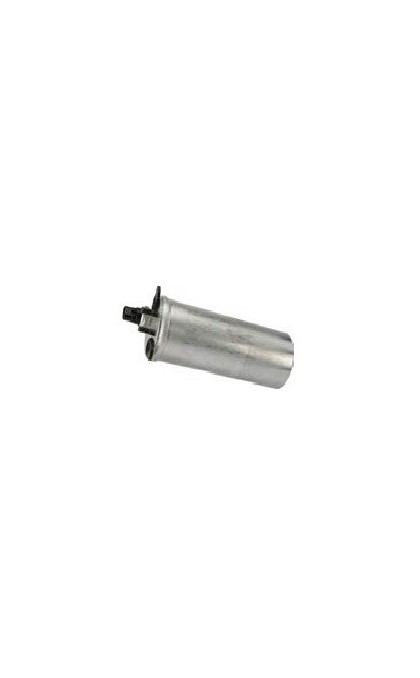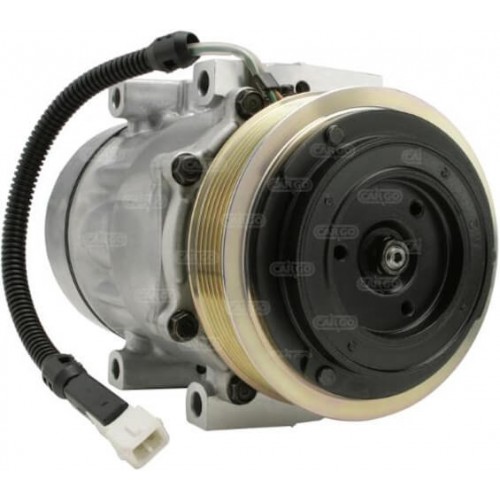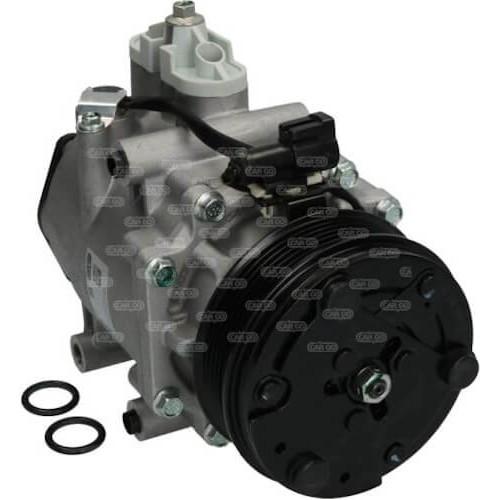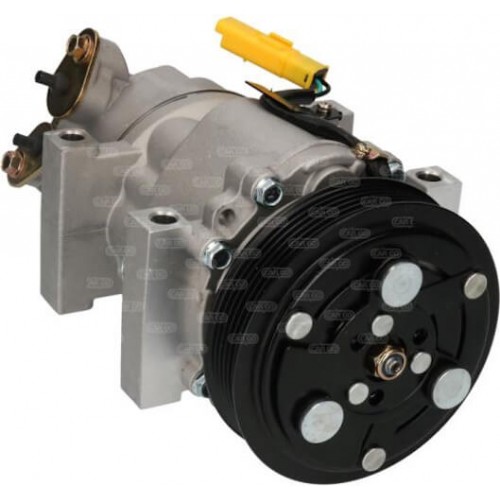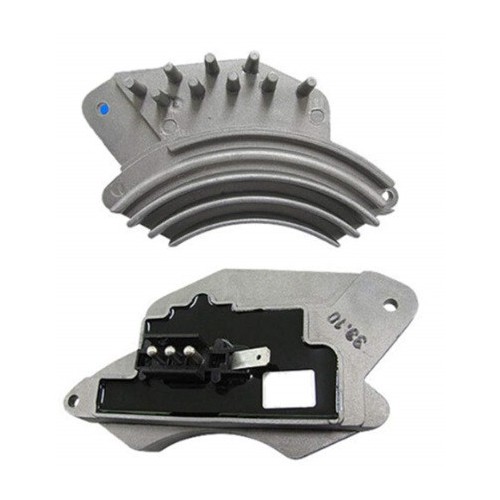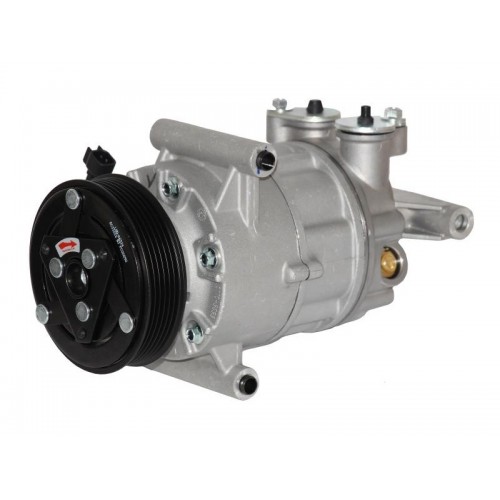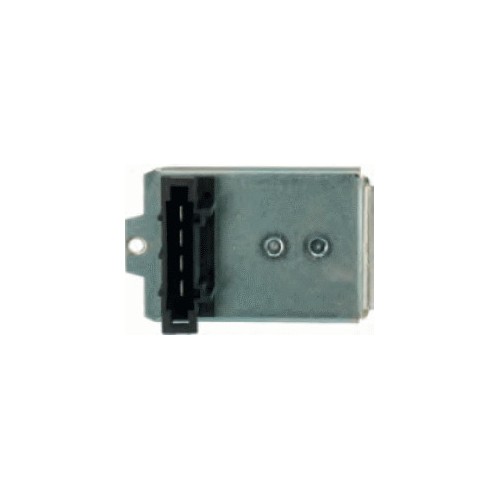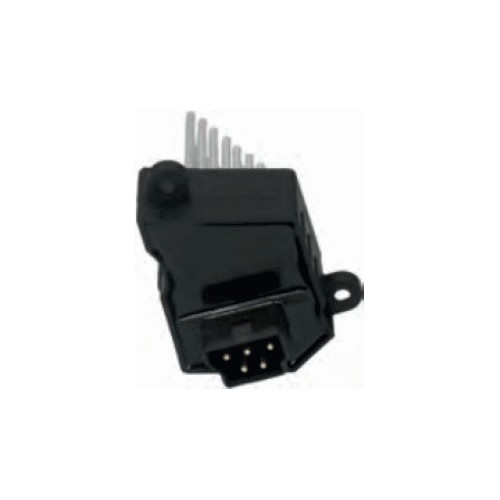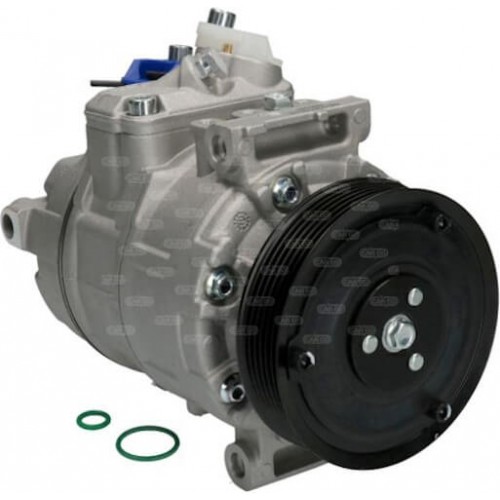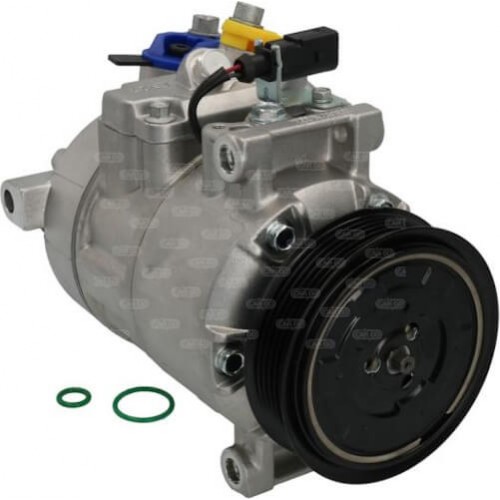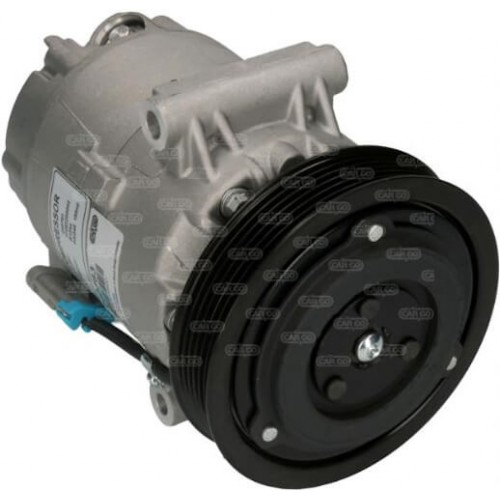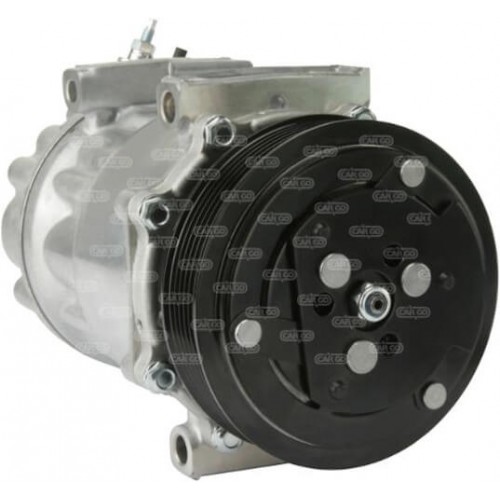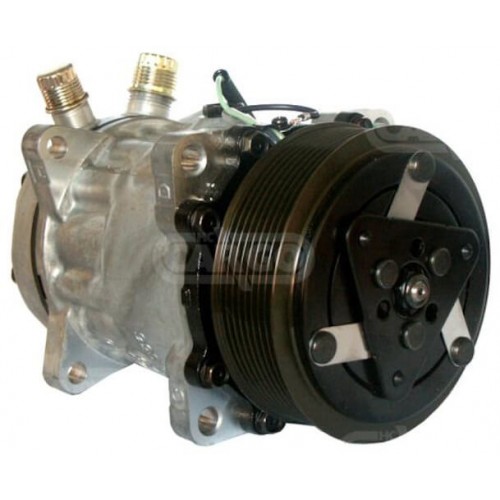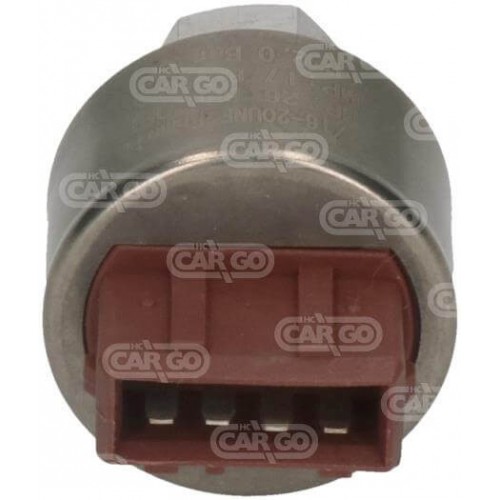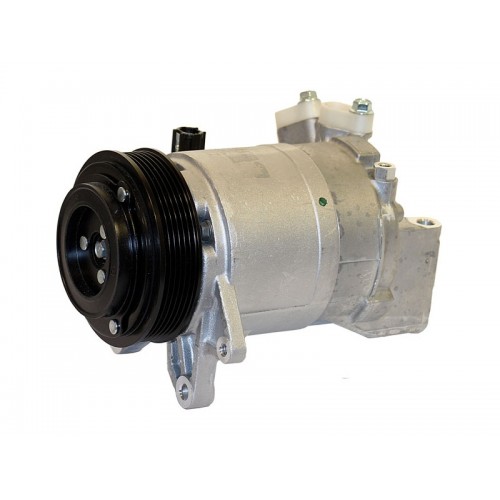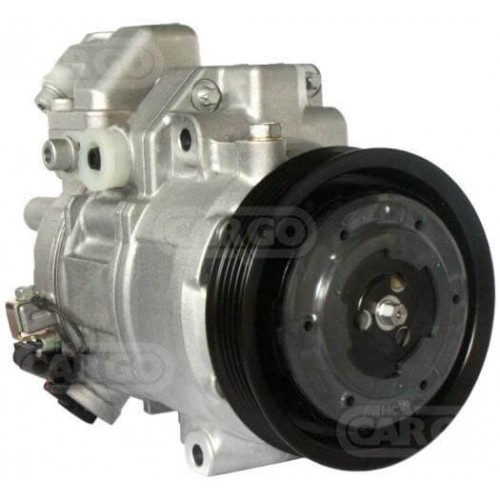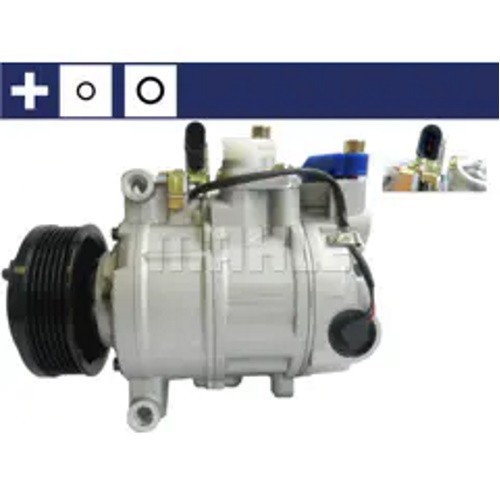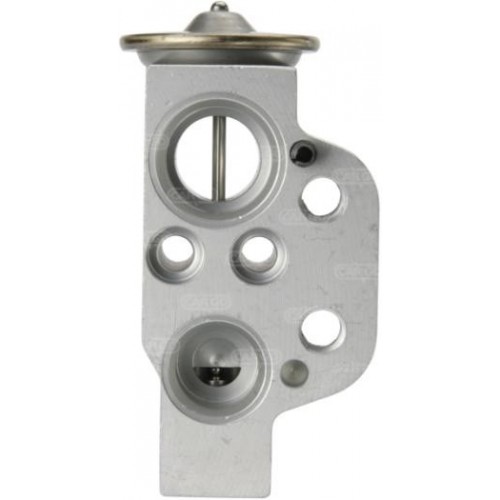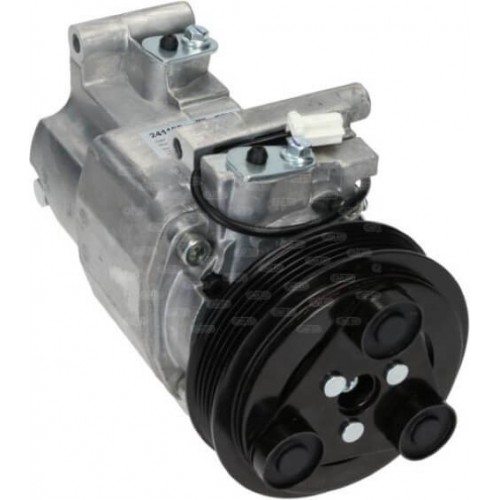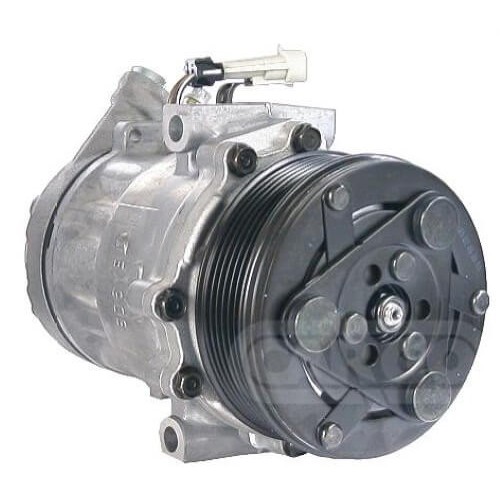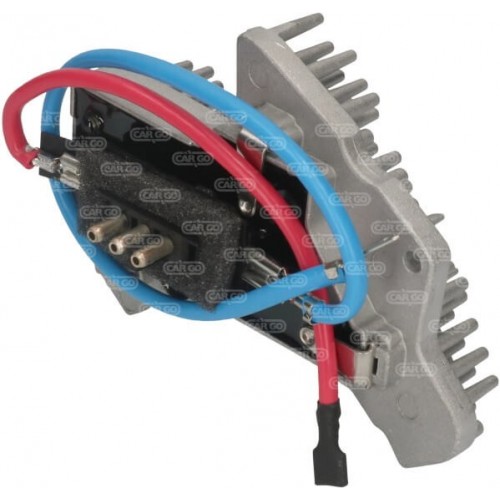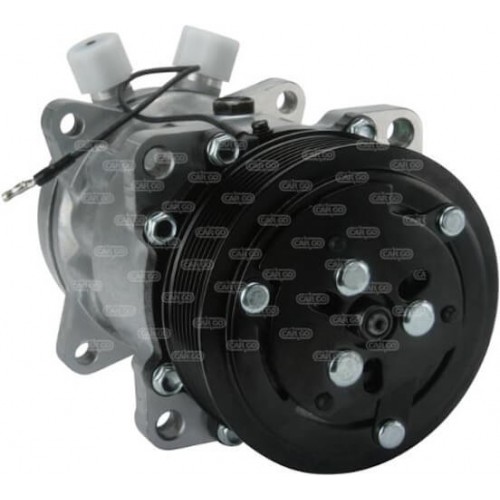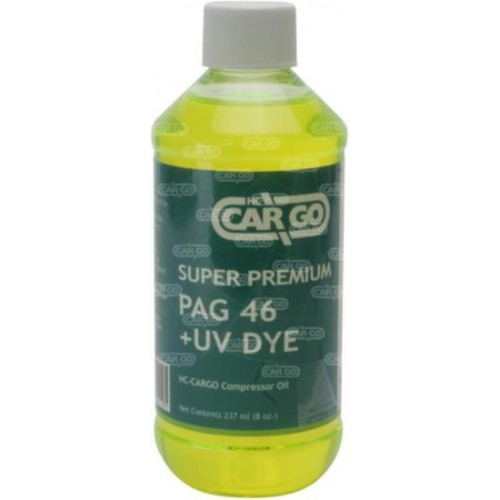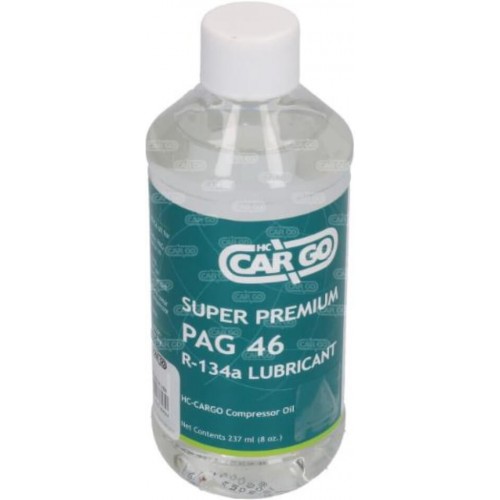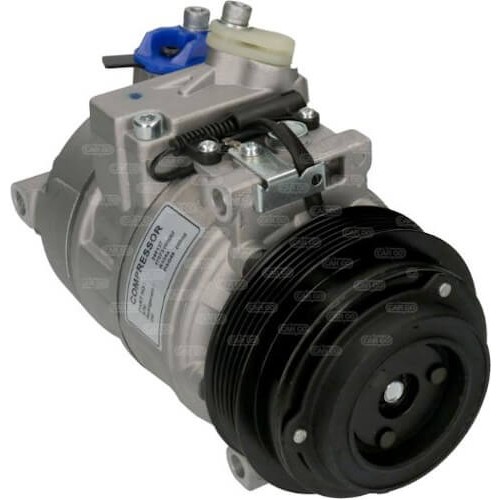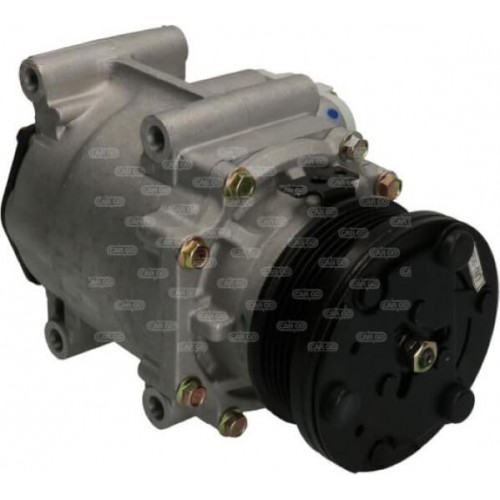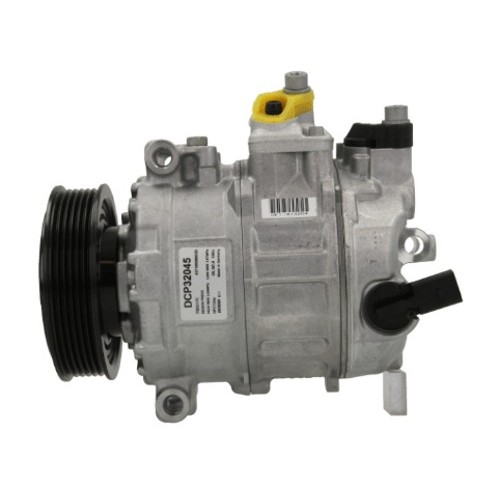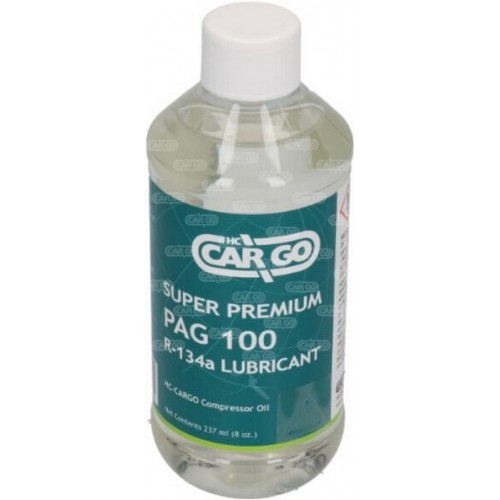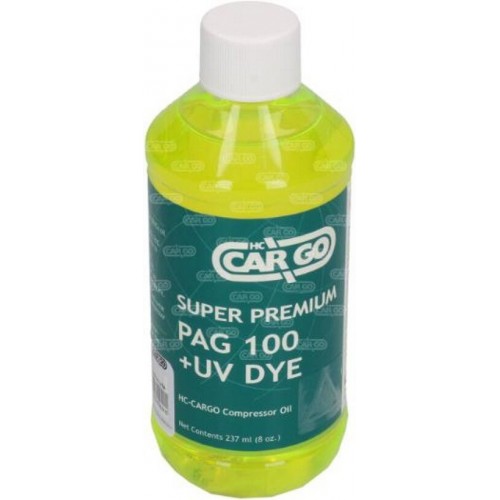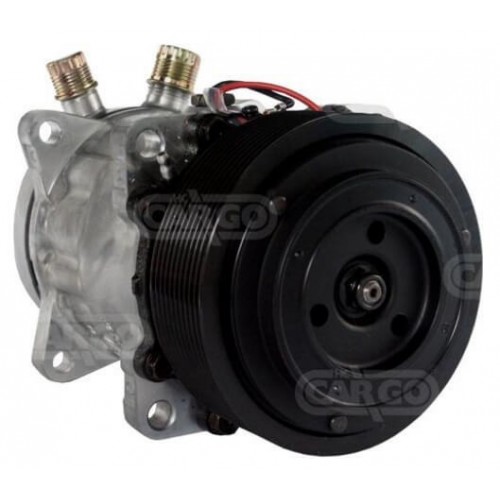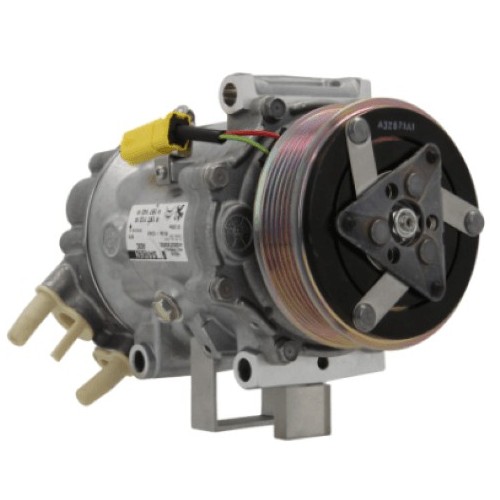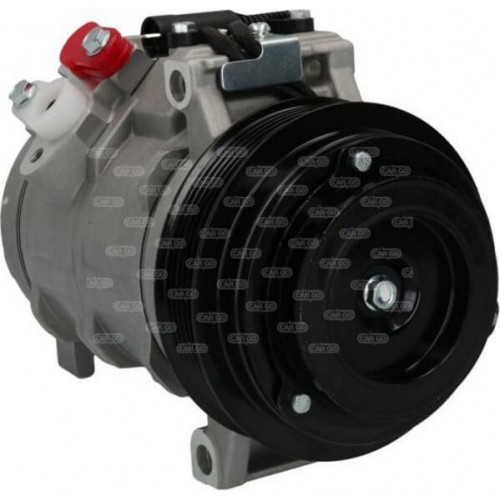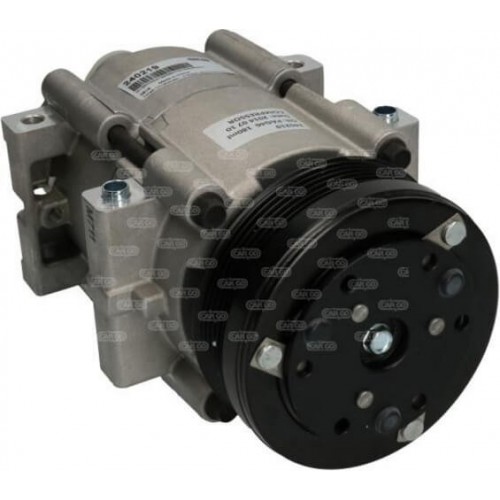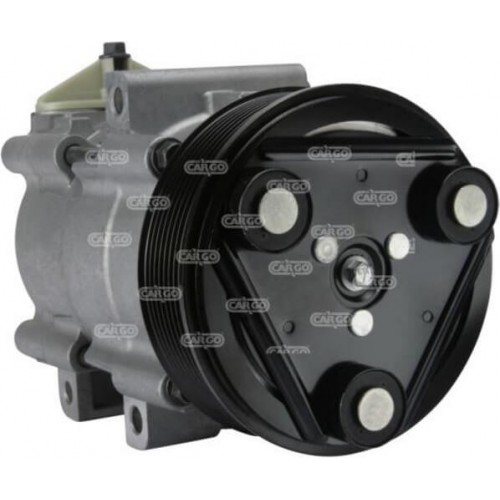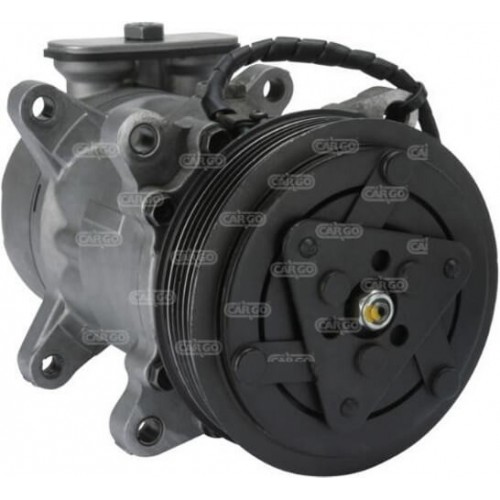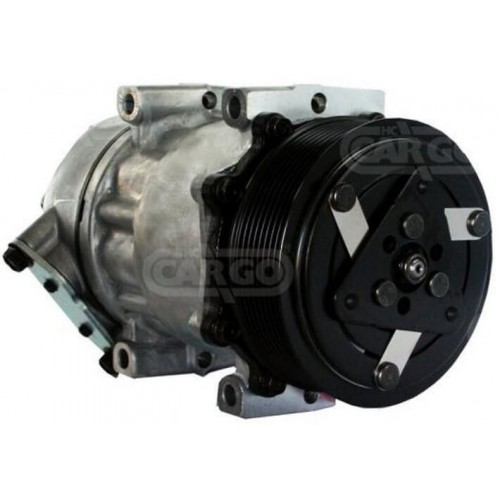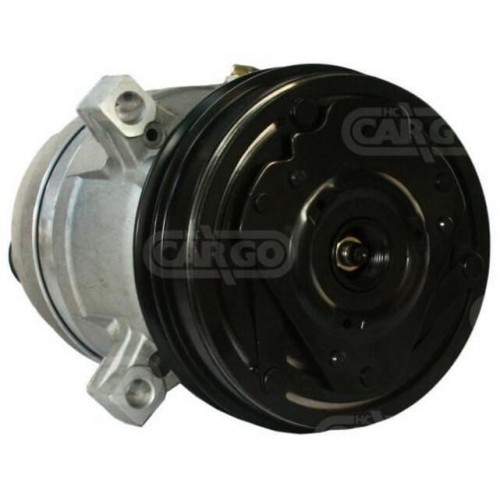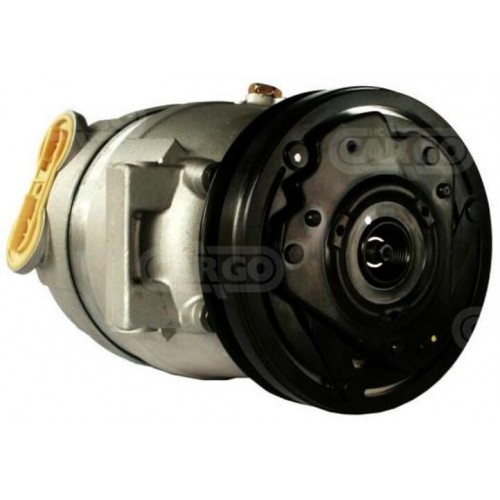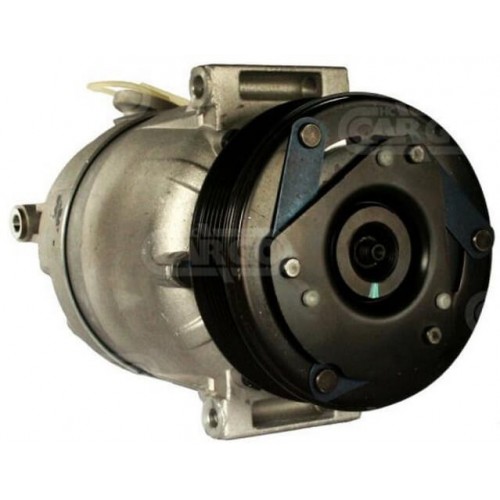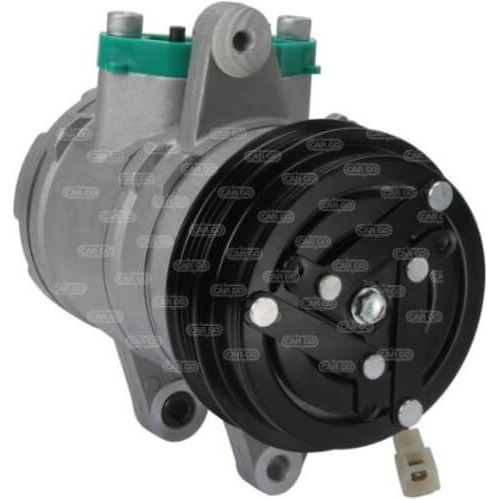- Contact-us
- info@wagendass.com
- 8h-12h & 14h-17h30 Monday to Friday
Air Conditioning 871 Products
The air conditioning system cools the air in the passenger compartment.
This technology in the automotive industry date all the way back to 1933 in New York, USA
The entire system includes an air conditioning compressor, condenser, evaporator, evaporator, filter drier. A fluid runs in a closed loop in the system.
It is important when replacing these components to drain the circuit and comply with the manufacturer's instructions.
Air conditioning compressors for cars, air conditioning compressors for tractors, air conditioning compressors for agricultural machines are available in the various categories of the site.
Subcategories
A/C Compressor for...
A/C Compressor for...
An air conditioning compressor is an essential component of a car air conditioning system. Its role is to compress the refrigerant, which circulates in the system, into a high pressure, high temperature gas. This gas is then cooled and condensed in the system's condenser, where it releases the absorbed heat into the car's interior.
The air conditioning compressor is usually driven by a belt connected to the car's engine. It is located near the engine and can be identified as a metal housing with refrigerant lines coming out of it.
If the air conditioning compressor is not working properly, it can lead to a loss of air conditioning efficiency or even a complete system failure. Signs of a malfunctioning compressor may include unusual noises, coolant leaks or an air conditioner that does not produce enough cool air.Dryers
AC compressor replacing SD7V16-1279 / SD7V16-1237 / SD7V16-1211 AC compressor replacing SD7V16-1279 /...
Replacing 6453CL Peugeot 6453JF Peugeot 6453KT Peugeot 699199 Valeo 71721765 Fiat NO WARRANTY CAN BE CLAIMED IF THE FILTER/DRYER IS NOT CHANGED WHEN INSTALLING THE NEW COMPRESSOR
229,90 €AC compressor replacing XS7H19497AA / 4365527 / 1S7H19D649DE AC compressor replacing XS7H19497AA /...
Replacing 1433094 Ford 1574386 Ford 1S7H19D629DA Ford 1S7H19D629DB Ford 1S7H19D629DC Ford 1S7H19D629DD Ford NO WARRANTY CAN BE CLAIMED IF THE FILTER/DRYER IS NOT CHANGED WHEN INSTALLING THE NEW COMPRESSOR
229,90 €AC compressor replacing SD6V12-1430F / SD6V12-1908 / SD6V12-1926 / SD6V12-1927 / SD6V12-1927E /... AC compressor replacing SD6V12-1430F /...
Replacing 6189501960 Fiat 6189509160 Peugeot 6453GZ Peugeot 6453JL Peugeot 6453KS Peugeot 6453LF Peugeot 6453LG Peugeot NO WARRANTY CAN BE CLAIMED IF THE FILTER/DRYER IS NOT CHANGED WHEN INSTALLING THE NEW...
218,90 €Blower Resistor replacing MERCEDES-BENZ 2108211651 Blower Resistor replacing MERCEDES-BENZ...
Electrical Information Voltage 12Physical Information No. pôles 4
39,90 €AC compressor replacing DAC8600258 / 6918122 / 64521171210 AC compressor replacing DAC8600258 /...
Replacing 1139014 Delphi 1139015 Delphi 11645610 VolkswagenNO WARRANTY CAN BE CLAIMED IF THE FILTER/DRYER IS NOT CHANGED WHEN INSTALLING THE NEW COMPRESSOR
199,90 €Ignitione pulseur d'air équivanet 701959263 for VOLKSWAGEN Ignitione pulseur d'air équivanet...
Ignitione pulseur d'air équivanet 701959263 for VOLKSWAGEN
14,90 €Module pulseur d'aire replacing 64116923204 / 64116929540 for BMW Module pulseur d'aire replacing...
Module pulseur d'aire replacing 64116923204 / 64116929540 for BMW
28,90 €AC Compressor replacing 4471805530 / 4471504205 / 1KD820803H/ PXE14-1706 / PXE14-1707 AC Compressor replacing 4471805530 /...
Replacing 012011032014 Audi see VW 1140562 Delphi 1471004770 Volkswagen 1K0260859F Audi see VW 1K0802803L VolkswagenNO WARRANTY CAN BE CLAIMED IF THE FILTER/DRYER IS NOT CHANGED WHEN INSTALLING THE NEW...
229,90 €AC COMPRESSOR replacing 4471501623 / 4471501910 / 4471807723 AC COMPRESSOR replacing 4471501623 /...
Replacing 1471005580 Denso 240858 HC-Cargo 240957 HC-Cargo 241509 HC-Cargo 2483000720 Denso 2483001240 Denso 2483001690 Denso 2483001790 Denso NO WARRANTY CAN BE CLAIMED IF THE FILTER/DRYER IS NOT CHANGED...
269,90 €AC Compressor replacing 7711135105 / 7711368685 / 1140543 AC Compressor replacing 7711135105 /...
Replacing 01139026 Delphi 01140017 Delphi 01140169 Delphi 1139026 Delphi 1140017 Delphi 1140169 Delphi 1140543 Delphi 2763000Q1E Nissan 2763000Q1E Renault NO WARRANTY CAN BE CLAIMED IF THE FILTER/DRYER IS...
299,90 €AC Compressor replacing SD7C164344 / SD7C161390 / SD7C161344 / SD7C161337F AC Compressor replacing SD7C164344 /...
Replacing 6453QL Citroen, see Peugeot 6453QL Peugeot 6453QN Peugeot 6453TP Peugeot 6453WN Peugeot 6453WP Citroen, see Peugeot 6453YF Citroen, see Peugeot NO WARRANTY CAN BE CLAIMED IF THE FILTER/DRYER IS NOT...
229,90 €AC compressor replacing SD7H154762 / SD7H15-6008 / SD7H15-8117 AC compressor replacing SD7H154762 /...
Replacing 241076 HC-Cargo 51.77970.7028 MAN 51779707006 MAN 51779707028 MAN 81.61906.6012 MAN 81.61906-6012 MAN SD7H154762 Sanden SD7H15-6008 Sanden SD7H15-8117 Sanden NO WARRANTY CAN BE CLAIMED IF THE...
199,90 €AC Pressure switch replacing PEUGEOT 6455T2 AC Pressure switch replacing PEUGEOT 6455T2
Generic BrandPhysical informationThread type InchesThread size 7/16-20 UNFNo./pins 4Refrigerant R134aO-ring w/o
13,90 €AC compressor Delphi CS86240-11B1remplace 1135025 / 1135295 / ACP1090000S AC compressor Delphi CS86240-11B1remplace...
AC compressor NEW replacing remplace GM 1135025 / 1135295 / 1135323 / 1135323 / 92089803 / GMP2114 Mahle ACP1090000S / 70817719 pour Opel It is important to replace the filter drier, condenser and expansion...
219,90 €AC compressor replacing 4371006150 / 4371006610 / 447170-7060 AC compressor replacing 4371006150 /...
Replacing 0002302111 Mercedes Benz 0002304011 Mercedes Benz 0002305911 Mercedes Benz 0002307911 Mercedes Benz 000230791180 Mercedes Benz 000230791187 Mercedes Benz 0002309411 Mercedes Benz 002302111 Mercedes...
299,90 €AC compressor replacing 447150-2760 / 447150-2761 / 447150-2762 AC compressor replacing 447150-2760 /...
Replacing 0002305111 Mercedes Benz 0002306511 Mercedes Benz 0002308111 Mercedes Benz 0002308511 Mercedes Benz 0002308811 Mercedes Benz 0002309011 Mercedes Benz NO WARRANTY CAN BE CLAIMED IF THE FILTER/DRYER...
259,90 €AC compressor Mahle ACP-182-000S replacing VW 4E0260805AB AC compressor Mahle ACP-182-000S replacing...
replacing 090205043 PSH32263NRF NRF32510 NRF4E0260805AB VW4E0260805AD VW4E0260805AJ VW4E0260805AP VW4E0260805BA VW4E0260805J VW4E0260805N VW70817515 Mahle72440616 Mahle89052 Nissens...
358,90 €Expansion Valve replacing 1K0820679 / TSP0585070 / 8UW351239661 Expansion Valve replacing 1K0820679 /...
Replacing 1K0820679 Volkswagen38417 NRF509901 Valeo60581243 schlieckmann840980N AKS Dasis8UW351239661 Hella940016 kagerTSP0585070 Delphi brand cargo Bosch
39,90 €AC compressor replacing CC29-61-450G / CC29-61-K00 / CC29-61-K00A AC compressor replacing CC29-61-450G /...
Replacing CC29-61-K00E Mazda H12A0BW4JZ Mazda H12A1AJ4DZ Mazda H12A1AJ4E2 Mazda H12A1AJ4EZ Mazda H12A1AJE4EZ Mazda NO WARRANTY WILL BE ACCEPTED IF THE FILTER DRIER HAS NOT BEEN...
249,90 €AC compressor replacing SD6V12-1418 / SD6V12-1418F / SD6V12-1423 AC compressor replacing SD6V12-1418 /...
Replacing 09132922 Vauxhall se Opel 1139009 Sanden 1854107 Opel 24416178 Opel 24421642 Opel NO WARRANTY CAN BE CLAIMED IF THE FILTER/DRYER IS NOT CHANGED WHEN INSTALLING THE NEW COMPRESSOR
239,90 €Blower Resistor replacing A2028207310 / A2108206210 Blower Resistor replacing A2028207310 /...
brand cargo BoschReplacing 05096842AA Chrysler2028207310 Mercedes Benz2108206210 Mercedes Benz2108700210 Mercedes Benz5096842AA Chrysler5096900AA ChryslerA2028207310 Mercedes BenzA2108206210...
0,00 €AC compressor replacing SD7H15-8100 / 820161581 AC compressor replacing SD7H15-8100 /...
Replacing 820161581 New Holland SD7H15-8100 Sanden NO WARRANTY CAN BE CLAIMED IF THE FILTER/DRYER IS NOT CHANGED WHEN INSTALLING THE NEW COMPRESSOR
219,90 €237 ml bottle of compressor oil PAG 46 237 ml bottle of compressor oil PAG 46
Physical informationContent 237 mlViscosity VG 46Refrigerant R134aCompressor oil PAG 46With UV dye YesPackaging informationPackaging Bottle
16,90 €Bottle of 237 ml of compressor oil PAG 46 / Refrigerant R134a Bottle of 237 ml of compressor oil PAG 46...
Catalogue informationRemarks Made in the USAPhysical informationContent 237 mlViscosity VG 46Refrigerant R134aCompressor oil PAG 46With UV dye No
16,90 €AC compressor replacing 446300-7900 / 447100-6821 / 230701187 AC compressor replacing 446300-7900 /...
Replacing 0002300911 Mercedes Benz 0002302011 Mercedes Benz 000230201180 Mercedes Benz 0002303911 Mercedes Benz 0002306811 Mercedes Benz 0002307011 Mercedes BenzNO WARRANTY CAN BE CLAIMED IF THE...
229,90 €AC compressor replacing DAC8623327 / VPYBYH19D629CA / XS7H19D629EA AC compressor replacing DAC8623327 /...
Replacing 1084732 Ford 1406037 Ford 3BYU19D629AA Ford 4002173 Visteon DAC8623327 Remy (delco) PYBYH19D629CB FordNO WARRANTY CAN BE CLAIMED IF THE FILTER/DRYER IS NOT CHANGED WHEN INSTALLING THE NEW...
248,90 €AC compressor DENSO DCP32045 replacing 1K0260859F / 1K0820803E AC compressor DENSO DCP32045 replacing...
1K0820859QX VW1K0820859S VW1K0820859SX VW1KD820803H VW1KD820803K VW1KD820803L VW1KD820803M VW2483000450 Denso2483001150 Denso2483001900 Denso2483002850 Denso2E0820803A VW2E0820803B...
239,90 €Bottle PAG 100 237 ml for air conditioning compressor Bottle PAG 100 237 ml for air conditioning...
Physical informationContent 237 mlViscosity VG 100Refrigerant R134aCompressor oil PAG 100With UV dye NoCatalogue informationRemarks Made in the USAReplacing ND9 DensoSP20 Sanden...
18,90 €Bottle PAG 100 D 237 ml for air conditioning compressor Bottle PAG 100 D 237 ml for air...
Physical informationContent 237 mlViscosity VG 100Refrigerant R134aCompressor oil PAG 100With UV dye YesCatalogue informationRemarks With UV dye. Made in the USAReplacing ND9 DensoSP20...
9,90 €AC compressor replacing SD7H15-8035 / 03129547 AC compressor replacing SD7H15-8035 /...
Replacing 03129547 Case 3129547 New Holland SD7H15-8035 SandenNO WARRANTY CAN BE CLAIMED IF THE FILTER/DRYER IS NOT CHANGED WHEN INSTALLING THE NEW COMPRESSOR
199,90 €AC compressor replacing SANDEN SD7V161864 / SD7V161876 / SD7V161864H AC compressor replacing SANDEN SD7V161864...
8FK351006201 Mahle Behr 9806706780 PSA 9806717980 PSA 9819711380 PSA 9819714280 PSAGarage documents regarding flushing and replacement of condenser, filter and dryer. Without these documents, the...
279,90 €AC compressor replacing A0012306911 / 68012250 / 4471905162 AC compressor replacing A0012306911 /...
Replacing 0002344011 Mercedes Benz 0012307111 Mercedes Benz 2473004530 Denso 4371006130 Denso 447190-5160 Denso NO WARRANTY CAN BE CLAIMED IF THE FILTER/DRYER IS NOT CHANGED WHEN INSTALLING THE NEW COMPRESSOR
179,90 €AC compressor replacing 1016093 / DAC8600162 / 7419307 AC compressor replacing 1016093 /...
Replacing 1007362 Ford 1010211 Ford 1016001013 Visteon 10-160-01013 Visteon 1016093 Ford 1024203 Ford 1026282 Ford 1028710 Ford NO WARRANTY CAN BE CLAIMED IF THE FILTER/DRYER IS NOT CHANGED WHEN INSTALLING...
219,90 €AC compressor replacing 3649381 / F75H19D629AA / 4502836 AC compressor replacing 3649381 /...
Replacing 1440713 Mazda 3649381 Ford 3983800 Ford 4345118 Ford 4502836 Ford 4681621 Ford NO WARRANTY CAN BE CLAIMED IF THE FILTER/DRYER IS NOT CHANGED WHEN INSTALLING THE NEW COMPRESSOR
219,90 €AC compressor replacing 6453JG / DAC8600118 / SD6V12-1412F AC compressor replacing 6453JG /...
Replacing 6453CN Peugeot 6453JG Peugeot 9628239480 Peugeot 9628239480 Citroen, see Peugeot DAC8600118 Remy (delco) SD6V12-1412F Sanden SD7V12-RA1501 Sanden NO WARRANTY CAN BE CLAIMED IF THE FILTER/DRYER IS...
219,90 €AC compressor replacing SD7H15-7980 / DAC8600161 / 699027 AC compressor replacing SD7H15-7980 /...
Replacing 1019771 Ford 10575186 DAF 10575186 Scania 1376998 Scania 1412263 Scania 1888034 Scania 1E0561450 Mazda 1E056150A Ford 240444 HC-Cargo 570894 Scania NO WARRANTY CAN BE CLAIMED IF THE FILTER/DRYER IS...
279,90 €AC compressor replacing 699076 / 7576000 / DAC8600044 AC compressor replacing 699076 / 7576000 /...
Replacing 1131665 General motor 699076 Valeo 71721689 Fiat 71781731 Fiat 7576000 Fiat 7661379 Fiat 7745384 Fiat 7773395 Fiat 7773398 Fiat DAC8600044 Remy (delco) NO WARRANTY CAN BE CLAIMED IF THE...
239,90 €AC compressor replacing 700653 / 96245943 / DAC8600154 AC compressor replacing 700653 / 96245943...
Replacing 700653 Daewoo 700696 Delphi 715051 Daewoo 96245940 Daewoo 96245943 Daewoo 96245943 Chevrolet 96245980 Daewoo 96255980 Chevrolet 96255980 Daewoo DAC8600154 Remy (delco) NO WARRANTY CAN BE CLAIMED IF...
249,90 €AC compressor replacing 1854011 / 90457635 / DAC8600056 AC compressor replacing 1854011 / 90457635...
Replacing 1135157 General motor 1135240 Opel 1135240 Isuzu 1135302 Opel 1135302 Isuzu 1135308 Opel 1135322 Opel 1135322 General motorNO WARRANTY CAN BE CLAIMED IF THE...
268,90 €AC compressor replacing 96568208 / 96314801 / 717752 AC compressor replacing 96568208 /...
Replacing 717639 Delphi 717646 Delphi 717752 Delphi 720076 Delphi 93741207 General motor 96314801 DaewooNO WARRANTY CAN BE CLAIMED IF THE FILTER/DRYER IS NOT CHANGED WHEN INSTALLING THE NEW COMPRESSOR
329,90 €
We've received a number of technical inquiries about the oil used in our air-conditioning compressor replacements, particularly for belt-driven compressors. Please note that all +Line compressors are pre-filled with the appropriate oil. However, the total quantity of oil required may vary according to the specific application.
To ensure you use the right type and quantity of oil, we recommend you follow the procedure below:
1. Drain the oil: Carefully drain the oil from the compressor. This step is important to ensure that any residual oil from the production process is removed.
2. Filling the system: Use an air-conditioning maintenance machine to fill the system with the right type and quantity of oil. This ensures that the oil is distributed evenly throughout the system.
Other technical considerations:
- Oil compatibility: Make sure the oil you use is compatible with your system's refrigerant (e.g. PAG oil for R134a systems). Using the wrong oil can lead to poor lubrication, increased wear and, eventually, compressor failure.
- System flush: if the system has been exposed to contaminants, or if a compressor has failed, it is essential to flush the system thoroughly before adding new oil and refrigerant.
- Oil viscosity: Check that oil viscosity is within compressor specifications. Correct viscosity is essential to maintain efficient lubrication and avoid damage to the compressor.
This procedure applies specifically to belt-driven compressors. By following these steps, you can ensure optimum performance and extend the life of your air conditioning system.
If you have any further questions, please do not hesitate to contact us.

